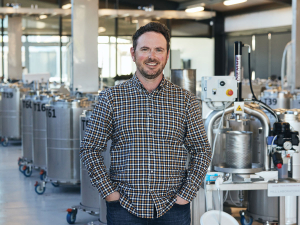In Braden Crosby’s many years as a winemaker and viticulturist in the Wairarapa, he enjoyed the mix of practical, applied research at Grape Days events, “with a little blue sky added for future reference”.
So when he joined Bragato Research Institute (BRI) last year as Knowledge Transfer and Engagement Lead, he relished the chance to help design a programme with practicable implications, now and into the future. “This year we are focusing back on the key outcomes of industry research, presenting some near-term and long-term messaging for the winegrower members.”
Looking at past learnings, Braden says Grape Days presentations on understanding and managing the sexual phase of powdery mildew were “invaluable” for viticulturists and growers, “as has been the virus elimination and grapevine trunk disease management strategies that have presented over the years”. The regional research days have been one of the key opportunities for the viticulture community to get together and learn from researchers and practitioners, he adds. “I think there has always been a few key take home messages to integrate into my management practices.”
The Grape Days events in Marlborough (June 24), Central Otago (July 2), and Hawke’s Bay (July 4), will present a mix of BRI’s medium-term projects on alternatives to cane pruning and grapevine remediation, as well as rootstocks and drought tolerance, vine improvement nationally and internationally, and discussion of both the Pinot Noir Vineyard Ecosystems programmes. “We want industry members to leave with an understanding of research that can impact them right now, and in the future,” Braden says. “To ensure the long-term sustainability of our industry.”
nzwine.com/en/initiativesevents/research














